Dark Arts – Bulgaria, Sofia
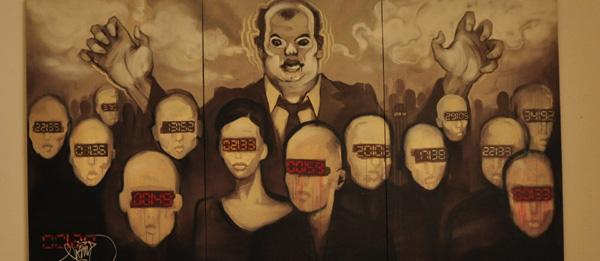
Bleak, but stirring, Eastern European artwork on the wall of the Art Hostel, a backpacker in Sofia, Bulgaria.

Bleak, but stirring, Eastern European artwork on the wall of the Art Hostel, a backpacker in Sofia, Bulgaria.
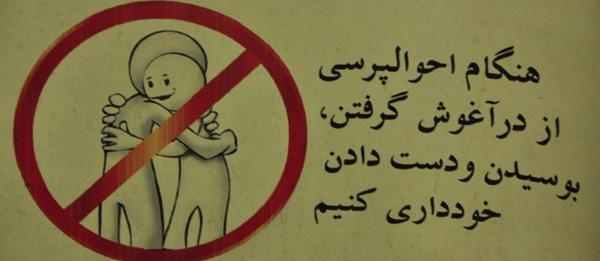
Sign seen in a subway in Tehran… No idea what it actually says in Farsi or whether it is supposed to be targeting men & women or just anyone in general. Relevant given that men seem to do a lot of hand holding & kissing in Iran…
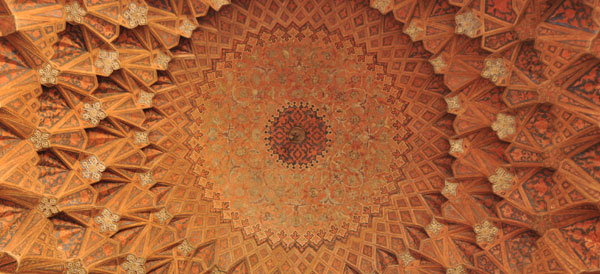
The intricacy, beauty and fractal detail of the great Iranian mosques is mesmerising, inspiring and incredibly humbling all at the same time. You could spend a lifetime just staring off into these ceilings, guess you would have to become a Muslim to do that though….hmm
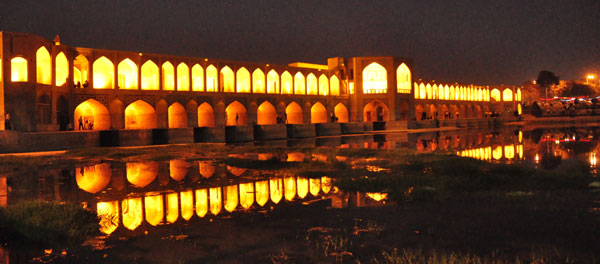
The stunning Khaju Bridge, one of 7 ancient bridges along the river and parks in beautiful Esfahan. As dusk falls, talented locals gather to quote poetry, sing folk tales and dance under the various arches. Truly magical!
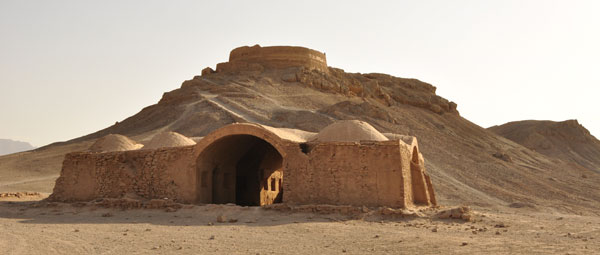
A Zorastrian fire temple, used for ancient sky burial rituals, looks out over an abandoned Zorastrian mud building in the desert around Yazd.
![Cappidocian Dreaming You would think after 2 months of exploring ancient cities, ruins and cave dwellings, we would get a bit tired of all this. But every […]](http://meltingplots.com/wp-content/uploads/2010/08/Capa.jpg)
You would think after 2 months of exploring ancient cities, ruins and cave dwellings, we would get a bit tired of all this. But every destination somehow entices, re-invigorates and sets wild the imagination in new ways. In all likelihood I also possess some strange, exotic historic positivity gene I suppose.
After our border shenanigans in Syria, we arrived in Antakya, Turkey mid morning only to find the connecting bus to Cappidocia was full and we were going to have to wait until 8.30pm that evening for another. Resigned to the delay, we set about a late breakfast at the Otogar – the amazing Turkish bus depots that seem to operate like airports here, with their myriad of services, restaurants and comforts. Figuring we had about 8 hours to kill, we inquired after a service bus into town and were instead offered a lift by a genial older gentleman named Burtak. Speaking little English, but with the aid of numerous hand gestures, some French and a few pages of a pretty limiting Japanese–Turkish glossary (mostly food references) in Megumi’s guide book, he proceeded to take us on a guided tour of his town. At first we weren’t too sure of his angle, being the somewhat wary travelers that we have had to become at times. A trip up to the hills overlooking the city in order to show us the great cave cathedral where Paul and Peter met in a series of meetings that laid the foundation for the modern Christian church, pretty much convinced us of his genuine enthusiasm and commitment to taking us on a tour though.
From a series of hand gestures and the odd successfully translated phrase we worked out that he was a teacher and worked to rehabilitate people suffered from head injuries or something like that – if not it was a beautiful lost in translation exercise. He then drove us about the picturesque town of Antakya (or Antioch as it was once known) for the better part of an hour; all of which gave off every feeling of having arrived at the Mediterranean and indeed the western world. Women wore tight clothing, hair and skin was displayed freely, sidewalks abounded with café’s and familiar brands with their requisite advertising popped up everywhere. It was all very welcome. We said goodbye to Burtak (a really fabulous gesture of hospitality) at a fascinating museum full of Byzantium Mosaics, then spent the afternoon patrolling the pleasant shops, restaurants and eateries either side of the river, people spotting and eventually settling into a pub to watch a world cup quarter final.
The next morning we arrived in Goreme, Cappidocia after catching possibly the most impressive overnight busride of my life. The back of each bus seat actually had its own TV monitor similar to those in the latest airplanes to chose movies from, plus USB ports so that we could review photos or listen to MP3’s etc. It was still early in the morning, but any claims to tiredness were easily overcome by the mystique cast by the towering rock formations growing up all over town. We set about exploring the place and found a nice pension with rooms carved into the rock-face (ie a cave room), with beds directly carved out of the mountainside itself and featured nice views over the stunning surrounding valley. Rooms are relatively cheap here as there is plenty of competition in town and the locals are very friendly. I had already forged a blood bond with a neighbour over our shared Anzac / WW1 tradition while checking out a room. It boded well – unpacked, breakfasted & relaxed – we had finally arrived.
Cappidocia is one of those places you would expect to only exist in children’s books. Strewn with valleys of strange ‘soft-serve’ shaped rock formations and towers of basalt, its curious geology has attracted people here since the Hittites in ancient times. The region features some 200 underground cities carved up to 7 stories below ground. While the basalt towers themselves have housed monasteries, churches, pigeons and people since the times of Christ – thousands of rock caves and homes are carved into the rock formations everywhere the eye can see. The towers themselves are known as fairy chimneys, because passing travelers on the old silk road, would see candle lights set in the holes of rocks towers from the many hermits and monks ensconced here. To the passers by though, it appeared as though fairy were at play amongst the eerie landscape. It’s a remarkably easy tale to believe actually, the place has that magical quality to it.
These days Goreme, one of the many small villages in the Cappidocia expanse is tourist grand central. Hundreds of pensions have been carved into the surrounding rocks and the village centre has been transformed into an epicenter for all the corresponding creature comforts, with a myriad of restaurants, bars and gift shops competing for attention. Just a short walk from this in seemingly every direction though, life remains much the same and villagers go about their daily life the same way as ever. Surrounding valleys are covered with grape vines on plots established long ago and brought under cultivation through the harvesting of pigeon shit via pigeon holes (houses) carved into many of the rock towers. Seriously, everywhere you look you can see the small holes at the top of the rock formations that served as pigeon fertilizer factories! Donkeys and horses still patrol the village roads and fields around and after dusk all the villagers tend to congregate outside their houses for tea and Nargilehs(water pipes) with the extended family in almost timeless fashion.
Naturally there is no shortage of tours or tour companies here, keen to package the sights. We signed up for a tour to visit some of the more far flung highlights and spent a whole day stopping at different viewpoints and experiencing the largest of the underground cities in Derinkuyu; a fascinating multilevel, 7 story, labyrinth below ground. Initially these were used by the Hittites simply for food storage and cooking in ancient times, but subsequently expanded by the early Christians in the Byzantine era to become full serving vertical villages defendable from persecuting invaders. Complete with churches and innumerable hidey holes, storage rooms, ventilation shafts and other spaces we can only begin to imagine uses for, each village is also amazingly connected to the next several kilometers away by a series of sealing tunnels far below ground as part of their defense network.
We also explored the Ilhra valley where numerous churches are carved into the valley walls and the stunning ‘Selene monastery’, a complex carved into a mountain with innumerable halls, rooms and other levels rising up the mountain rock-face. We then finished the day by soaking up the stunning sunset over Goreme and the cascading evening shades of the Pigeon, Rose and other surrounding valleys. We have done more sunsets in the last year than I can remember ever consciously doing. It just doesn’t seem to get tired, but our photography skills are really not improving at all with the practice.
Done with tours, the next day packed to the gills with liquid we braved the heat to spend the day trekking through the various surrounding valleys and landscapes on our own tod. Cappidocia is a rabbit warren of hidden valleys and features, each of the surrounding valleys surrounding Goreme features different colours and formations. Starting with the open air museum a couple of km out of town, the museum is really a valley of towers that served as a monastery – complete with a series of churches and catherdrals carved into the rock faces. From there, we happily stepped off the reservation got ourselves lost, traipsing through the various shades of the White, Rose, Pigeon, Red, Swords and Honeycomb valley formations. Along the way, we forged our own paths through seemingly forgotten vineyards and abandoned towers – once homes or monasteries long since loved. The combination of colours and bewildering rock formations was mesmerizing, a blank canvas for the creative imaginings of times past or dimensions distant. 8 hours or so later we emerged back on to a main road at another valley, a site full of rock formations that resemble mushrooms, where we caught the bus some 17km back to into town. A really enjoyable day!
Cappidocia is such a weird profusion of natural geological wonders, seemingly perfectly intertwined and adapted for mans requirements throughout history whether fleeing persecution or seeking spiritual seclusion. Yet despite its popularity, its an area still vibrantly and culturally alive, the Turkish people of the region going about the habits largely unencumbered by the tourist influx at work. It’s truly a magical, sacred pace. We could have tarried here much longer had we not a pressing engagement with the great Persian empire.
![Showdown on the Syrian Border It was time…. For an hour I had been sitting back watching the pandemonium in front of me ebb and flow, waiting for a quiet […]](http://meltingplots.com/wp-content/uploads/2010/08/Barb1.jpg)
It was time…. For an hour I had been sitting back watching the pandemonium in front of me ebb and flow, waiting for a quiet window or some semblance of order to emerge in the 40 degree heat. It hadn’t happened and with another thousand Syrians pressed up against the border gates behind me, chomping at the bit to get inside time was running out, I needed to get amongst it. With a deep breath, I pressed into the seething mass holding my and Megumi’s passports above my head. Somehow I needed to get past the hundreds of other frantic Syrians to the passport window and get a Visa stamp from the Turkish customs official. There was no line here, just a surging, unrelenting, shouting mass of men pressed desperately up against the window in the heat, women sheltering under the shade away to the side. The other 2 booths were even more manic, progress just didn’t seem obvious at all, but there was no other way around it.
Having crossed some 15 or so land borders so far in our travels, we were starting to become old hands at the game or so we thought. Myanmar had been the toughest visa wise, Nepal / India just plain confusing and Tanzania / Kenya at night probably the most treacherous, but our Syria crossings was more akin to being transported onto the set of a strangely stereotypical Middle Eastern BBC report. It was something else again entirely!
The crossing into Syria had been a mission in itself. A mission of faith, like walking into the unknown if you will. Lonely Planet says everyone needs a Visa before they go and they likely won’t hand it out on arrival. Blogs and other travellers all said otherwise and that they were able to get it just rocking up, but the experience ranged from 8 hour waits (especially for Americans) to outright rejection (again especially for Americans); for others a slight delay perhaps, but hugs from the customs official! Justifiably a little hesitant and unable to wait the 2 months somewhere for the visa approvals in advance, we decided to forego the normal public transport options and throwdown some cash to take a taxi from Amman in Jordan to the Syrian border. If we did get delayed, rejected or any other such major hassle, we would be able to avoid the risk of getting lynched by other bus passengers forced to wait around for our visa resolutions. So take a taxi we did, possibly our most luxurious mode of trans-border transport thus far for the 3 or 4 hour journey to Damascus, we had also heard that the taxi driver usually lent a hand to try and smooth their own ride. We were open to any help we could get.
The Jordan border was interesting, there were no lines, just some 50 or so people amassed against the customs window yelling and thrusting passports in front of them to the officer, a slight portend of things to come as I would later realise. The requisite behaviour on our part ran a little in the face of our cultivated Japanese restraint, the driver not so encumbered, grabbed our passports and thrust himself into the mass trying to use our international status as leverage. 20 minutes later he emerged successful and we were through to the Syrian side. The Syrian border office by contrast was very orderly with a dedicated window for foreigners. The driver pointed us in the direction and we set about filling in our forms and submitting the documents. As we also needed to submit our vehicle number, I stepped back outside to find our taxi number plate and curiously found our driver sitting in the rear of the taxi, tightening screws into the backboard of the driver seat. He acted nonchalant enough, I said nothing and returned inside to argue our case.
With no competition, the customs guy had to deal with us. I explained we were travelling for 9 months and thus had no access to our Syrian embassy back home for the required visa. He pulled some faces, said Australia I can understand, but that he could not accept Japan. We started to argue, the driver re-appeared yelled some stuff as well and after a 10 minute wait while certain backgrounds and details were checked, our passports were returned and we were directed to pay the Visa fee’s (A$100 for me) and be on our way. Returning to the cab, we suddenly noticed we had 2 bags of duty free cigarettes strategically placed at our feet. The driver didn’t even bother to fill us in and obviously was angling to make a buck on our duty free count – I could guess what the back of the seats contained as well. As he jumped into the driver seat, a screw popped out and visually confirmed this for us. And as we pulled up to the customs agent, the backboard fell back to reveal another 5 or so boxes buried underneath. I decided not to notify the driver and let it play, the customs agent didn’t even throw us foreigners a glance so it didn’t matter – we were through. Not such a big deal after all.
Here we are though just over a week later and heading out the other side of Syria on the Turkish border. This time there was supposed to be no visa stress (Australians / Japanese automatically get a visa in Turkey), so we caught an early bus from Aleppo (5am) to Antikaya (Antioch) on the Turkey side. The bus was packed full of a friendly bunch of Syrians taking advantage of their day off (Friday is the start of the weekend in the muslim world) to visit Turkey, it was only an hour to the border and an easy drive. As the only foreigners, our fellow travellers all seemed particularly attentive to our needs on the bus, a nice brand new Turkish number. We were given water, shown how to use the seats and air conditioning (I actually thought they took us for idiots for a while!) and one particular sharply dressed lad with jeans a little too tight was going out of his way in his offers to help us with the Visa / passport queues. Now Syrian people are some of the nicest you will meet so I took this all in our stride. At the Syrian passport control, we were guided to the relevant forms, departure tax area and our passports aggregated and jointly submitted for us nice and efficiently. Then we were naturally asked if we would mind carrying some duty free cigarettes for the helpful fellow. Used to the ritual I said sure, suddenly realising the reason for the friendliness. He had gotten in just in time as well. As we rejoined the bus, we had to wait some 30 minutes while all the other passengers and staff loaded up on Duty Free cigarettes. Bags were being redeposited on the bus, bursting at the seems, duty free bags loaded with smokes were being carried on board and suddenly everyone was clamouring to wrap the cigarette cartoons into smaller bags, (some in black to match the bus interior) and stash them all about the bus. We must have been asked 5 or 6 times to take someone else’s.
When we eventually proceeded through to the Turkish side of the border we found the road blocked and a huge crowd of people in front of the immigration checks, 3 lone toll booth looking things in the middle of the highway. After a 30 minute wait at the gates we were allowed in and told to get our passports checked by Turkish customs so that we could get our Visa. The crowd sprinted away as the gate opened reminding me instantly of those desperate shoppers on the opening morning of the post Christmas sales we always saw on the TV news growing up. The visa had sounded simple enough really and I guess most days it probably is. This being Friday though, everyone in Syria was on their way to Turkey for the day (likely just for the cigarette run) and anxious not to waste a second. The tiny windows of the 3 immigration / police boxes were the centre of a sweaty manic scrummage. Crowds of hundreds of men pushed against the window waving passports and as progress slowed to an infinite crawl, well positioned men started to take other peoples passports on contract, holding bundles of up to 20 or more in the air. Watching on the outskirts mystified by the chaos on display, we also saw women seductively walked up to the back of the customs police doors and dip their veils to reveal enough hair and skin to entice the official to bypass the process, derailing all progress & incensing the crowd even further. It was a lot to take in.
After 20 minutes of pushing I gave up my futile attempt at getting close to the window – sweating and exhausted I started looking for a short cut. One of the guys from our bus had spent a few hours now squashed desperately against the window and myself along with other members of the bus seeing him as our best option, rallied together to hand him our passports to represent. Inevitably all around us, fights had started breaking out as frustrated overlooked Syrians, jilted passport holders and impatient others all degenerated into heated confrontations. After another hour and a half of yelling, fighting, cursory military interventions and finally strikes by the Turkish immigration officers who started refusing to serve anyone until things quietened down, I got my piece of paper. This precipitated a 200 metre run to the visa payment window and then back again (with the receipt) to hand to our bus guy, still trying to hold a place at the customs window against the tide until everyone on the bus got their passports sorted. In the distance I could see the next thousand Syrians storming through the just opened border flood gates. Way too close!
Wild and exhausted we got back on the bus, but the adventure was far from over. As we approached the customs gate, everyone on the bus started to become nervous and a noticeable tension filled the air. As the bus stopped, a customs officer aggressively boarded, herded us all off and started unloading our bags onto the pavement, scouring every centimetre of the bus with a cigarette detecting comb. A steady stream of black plastic wrapped cigarette cartons were hurled out onto the pavement, then systematically an inspection began on every piece of luggage. We watched, hypnotized by the smuggling farce unravelling before us. From luggage bags, jeans were being removed with cigarettes cleverly inserted into every pocket and cartons down each trouser leg, jackets with packets loaded into every pocket were emptied onto the pavement. Suitcases were cut open and gift wrapped presents torn apart, to reveal other innovative hiding places laden with concealed cartons and individual packets. Bemused, I lost count of how many cartons were seized and hurled away for confiscation, literally hundreds.
Our bags had been strategically place either side of another suspicious looking bag and other personal carry bags seemed to be finding their way into close proximity to where we were standing (Megumi was asked to actually lean on one). Obviously foreigners (non Syrians) had the best chance of getting through this all unscathed, I would hate to know what had actually been put into our backpacks. I had to figure that any spare space was also probably crammed to the gills while we weren’t looking as well and I was preparing myself to ‘deny all knowledge’ when the seemingly inevitable confrontation came. Sure enough though, we didn’t even get checked and the 2 or 3 bags we were ‘protecting’ didn’t get searched either. Completely mesmerized by the spectacle as we were though, one of the bags we were ‘carrying’ for the ‘tight jeaned’ guy somehow got confiscated before we could defend it.
Search & reprimands done (no punishments or fines here, just confiscation), we were herded back into the bus (where I found 2 more black bags strategically placed on my seat) and then we were waved through customs as they moved onto the next bus. No sooner had we had crossed into Turkey, when everyone stood up and started taking stock of their remaining inventories. Black bags were brought down from all sorts of still undiscovered hidey holes; there were sad expressions from Mr Tight jeans and numerous others on board whose cunning plans and strategies had all been foiled; plus some elated grins from the guy who had thought to put his bags next to ours. All told we had spent more than 4 hours in immigration & customs limbo. I have no idea how much these guys were all looking to make from this – probably double their money, a couple of hundred bucks or so maybe which might make it a lucrative profession given the bus staff do this run at least once a day. It was a bizarre and equally otherworldly spectacle with some fantastic learning experiences – never cross the border on the Muslim weekend and next time definitely take a taxi instead! Oh wait……!
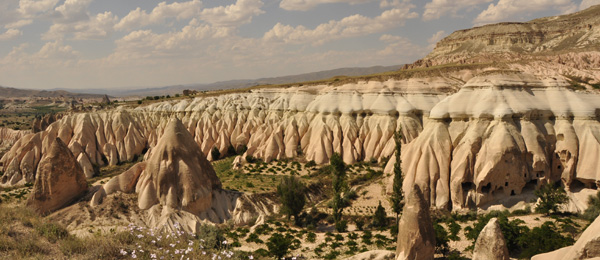
One of the many multicoloured, basalt towered, soft serve valleys that make up the mystical Cappidocia region. The numerous towers are riddled with hollowed out monasteries, homes, hotels and pigeon farms.
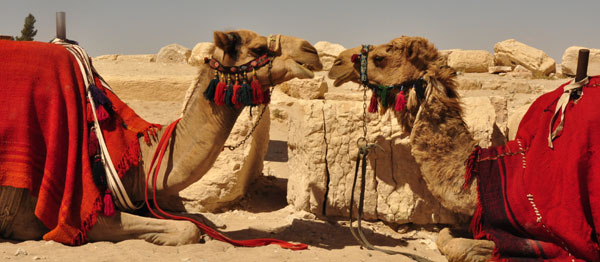
Lovers, brothers or just intense non-verbal communication? Camels awaiting riders in the ruins of Palmyra. The once great Aramaic city, centre of trading on the silk road in Syria and key stop on the road to Baghdad.
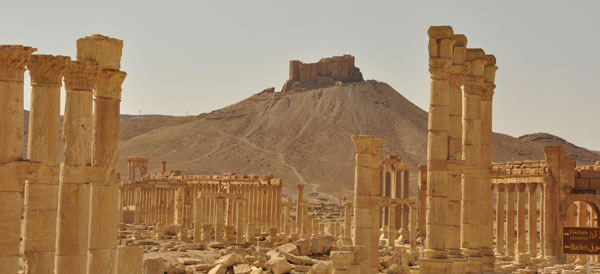
An old Arabian fort looks down on the ancient ruined city of Palymra, one of the Middle East’s greatest ancient sites and sole attraction in the ‘no man’s’ land of the Syrian desert and border with Iraq.
| M | T | W | T | F | S | S |
|---|---|---|---|---|---|---|
| « Apr | ||||||
| 1 | 2 | 3 | 4 | |||
| 5 | 6 | 7 | 8 | 9 | 10 | 11 |
| 12 | 13 | 14 | 15 | 16 | 17 | 18 |
| 19 | 20 | 21 | 22 | 23 | 24 | 25 |
| 26 | 27 | 28 | 29 | 30 | 31 | |
Copyright Melting Plots.